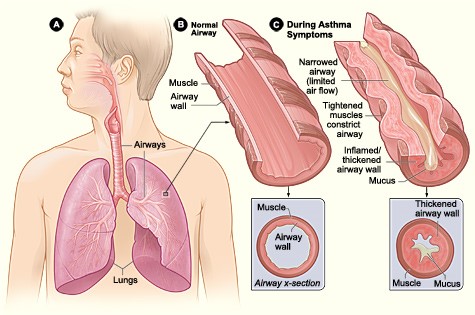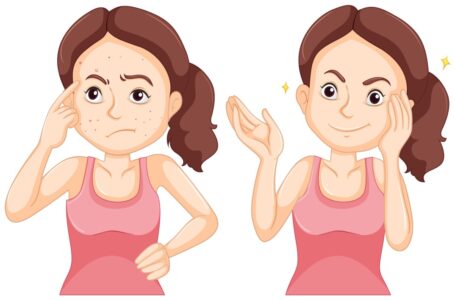Unfolding the Folds of Breast – World Breastfeeding Week 2021

“Asthma” A Multi Miasmatic Disorder Under Homeopathy
The term ‘asthma’ is a Greek word that means ‘breathless’ or ‘ to breathe with an open mouth’. Asthma is a chronic inflammatory disorder of the airways. It causes swelling or inflammation of the inner wall of the bronchial tubes. Chronic inflammation is related to airway hyper-responsiveness that results in recurrent episodes of wheezing, breathlessness, chest tightness, and coughing, particularly at night and in the early morning.

CAUSES OF ASTHMA:-
The exact cause is still unknown but some factors like environmental, genetic, etc an important role in its development. Along with these, so many triggering factors responsible for its flare-up.
- ENVIRONMENTAL –
Many environmental factors are related to asthma’s development and exacerbation including allergens, air pollution, and other environmental chemicals.
- GENETIC-
Family history also plays an important role in the development of asthma.
Smoking during pregnancy and after delivery is also associated with a greater risk of asthma-like symptoms.
- MEDICAL CONDITIONS-
A triad of atopic eczema, allergic rhinitis, and asthma is called ‘atopy’. The strongest risk factor for developing asthma is a history of atopic disease; with asthma occurring at a much greater rate in those who have either eczema or hay fever.
Asthma has been associated with eosinophilic granulomatosis with polyangiitis, an autoimmune disease, and vasculitis.
Obesity is also linked with the development of asthma.
- TRIGGERING FACTOR-
Exposure to varied irritants and substances that trigger allergies can trigger signs and symptoms of asthma. Asthma triggers are different from person to person and may include:-
- Allergen inhalation- such as pollen, dust mites, mold spores, pet dander, or particles of cockroach waste.
- Air pollutants- such as exhaust fumes, perfumes, cigarette smoke.
- Viral upper respiratory tract infection
- Sinusitis
- Exercise
- Cold dry air
- Stress
- Certain drugs – such as aspirin, NSAIDs, beta-adrenergic blockers.
- Occupational exposure- such as metal salts, wood and vegetable dust, industrial chemicals, and plastics.
- Certain food additives
- Gastro-oesophageal reflux disease.
TYPES OF ASTHMA:-
- ALLERGIC ASTHMA (EXTRINSIC ASTHMA)-
This is the most common type of asthma. Allergens are substances that cause an allergic reaction. They enter the body through inhalation, swallowing, touching, or injection.
Allergic asthma occurs because the immune system identifies the allergen as a threat. When someone with allergy-induced asthma comes in contact with a trigger substance, the body responds by releasing antibodies called immunoglobulin E.
Immunoglobulin E causes immune system cells to release chemicals that produce inflammation in the lungs.
Common allergenic substances include:- cockroaches, household dust mites, mold, pet dander, urine, feces, saliva and hair, pollen, and fungi.
- NON- ALLERGIC ASTHMA (INTRINSIC ASTHMA)-
Any form of asthma that is not triggered by allergies is termed “non-allergic asthma”. While the symptoms of non-allergic asthma are more or less just like those of allergic asthma the triggers are different. Some common triggers in people with non-allergic asthma include- infections, exercise, and stress. The age of onset for intrinsic asthma is after 30 years.
- EXERCISE INDUCED ASTHMA-
Also called exercise-induced bronchoconstriction (EIB), this is shortness of breath or wheezing triggered by exercise, especially if it is done in cold, dry air. The symptoms usually start a few minutes after you begin exerting yourself and may go on for an extra 10- 15 minutes after you finish. Coughing is the most common symptom.
- COUGH VARIANT ASTHMA
Because many people, including doctors, often do not think of coughing as the first sign someone has asthma, this type can easily be misdiagnosed. This is triggered by many of the same things like other types of asthma-like viruses, allergens, exercise, etc but can be more difficult to treat than other asthma types.
- OCCUPATIONAL ASTHMA-
Certain occupations seem especially susceptible to asthma, including baking, farming, and dealing in metal, wood, and plastic industries
- NIGHT TIME (NOCTURNAL) ASTHMA-
As the name implies, in this type, symptoms worsen at night. This may be because of increased exposure to allergens, cooling of the airways, reclining position, or even hormone secretions that follow a circadian pattern.
- ASPIRIN INDUCED ASTHMA
It is triggered by taking an aspirin. Other nonsteroidal anti-inflammatory drugs like ibuprofen ( Motrin, Advil) or naproxen (Aleve) can also set off asthma symptoms. People with nasal polyps are more likely to possess aspirin-induced asthma.
CLINICAL FEATURES
Typical symptoms of asthma:-
- Recurrent episodes of wheezing
- Chest tightness
- Breathlessness
- Cough
- The onset is abrupt in most cases. These attacks may occur seasonally or during all times of the year (perennial asthma). The attacks may last for several hours if untreated.
DIAGNOSIS
The diagnosis is predominantly clinical and based on a characteristic history. A long duration of complaints, history of allergy, and positive family history are other helpful clinical points.
PHYSICAL EXAMINATION– it is important to assess for signs of respiratory distress, including tachypnoea, use of accessory respiratory muscles, and cyanosis. On lung examination, there could also be wheezing and rhonchi throughout the chest, typically more prominent in expiration than inspiration.
BREATHING TEST- Pulmonary function test (PFT’s) measure airflow into and out of the lung.
BIOLOGICAL CONFLICT ASSOCIATED WITH ASTHMA:-
The brain is the commanding organ of our body. It controls everything that happens in our bodies. Whether in sick or in healthy conditions, the brain is the one who regulates everything. Whenever there is any disease, its manifestation is first reflected at the mental level before the appearance of any physical sign and symptoms. So it is very important to look forward to this mental symptom to treat the disease judiciously.
The biological conflict associated with Asthma is ‘Death Fright conflict’ or a ‘scare- fright conflict’. The person is very much frightful. There is ‘fear of losing life’ or ‘fear of losing something valuable’ which is important for life. The person may get frightened even by thinking of this thought. He used to cry, seek help sometimes even manage the situation by himself. This fright conflict may develop after something bad happens like an accident that may cost his life but somehow he was alive, death of near ones, or any situation that put a bad memory in the mind. Likewise, whenever there is any medical report suggesting some serious illness, he got afraid that he might lose his life. The person is so much apprehensive that he used to avoid the crowd, going to places like malls, markets, in a fear of losing life.
In the case of children, strong yelling by parents or a teacher may lead to the development of this conflict. Whenever a child suffers from a bully in a school, and no one is there to help him in this situation, he starts avoiding school and people, he says nothing to anyone, slowly he develops this fright conflict. If a child saw his parents fighting with each other, or any kind of violence, the child will not say anything but deep inside he develops this conflict.
HOMEOPATHY AND ASTHMA:-
As per the concept of homeopathy, Asthma is a multi miasmatic disorder, predominantly falls under the category of Sycosis. The therapeutic approaches adopted are i) to control the acute attack, ii) to prevent the recurrence iii) to prevent complications.
The selection of remedy is based upon the theory of individualization. The aim of homeopathy is not only to treat asthma symptoms but to address its underlying cause and individual susceptibility. As far as therapeutic medication is concerned, several medicines are available for asthma that is selected based on cause, sensation, modalities of the complaints.
Some of the important homeopathic medicines for asthma with its indication are discussed below:-
- Natrum sulphuricum– one of the best remedies for asthma. Asthma is aggravated by damp weather, the severe cough that makes a person hold his chest while coughing. Greenish expectoration.
- Aconitum napellus– Constant pressure in the left chest; oppressed breathing on least motion, loud, labored breathing. Very sensitive to inspired air. Shortness of breath. The larynx is sensitive. Hot feelings in the lung.
- Ipecac– Asthma with nausea and vomiting. There is a constant cough with vomiting and gagging.
- Antim tart– Asthma is associated with a lot of rattling in the chest with little expectoration.
- Sambucus nigra– Indicated for childhood asthma. The attack is generally worse at midnight making the child wake up from sleep.
- Senega– Wheeze and cough end in a sneeze. There is a pain in the back on coughing. Rattling in the chest.
- Medorrhinum– Asthma better by bending his head on a pillow and the patient desires a fast fan even in winter with a craving for ice.
- Lobelia inflate– Asthma with weakness, felt in the pit of the stomach and preceded by prickling all over.
REFERENCES:-
- Harrison’s Principles Of Internal Medicine, 19th Edition
- http://www.webmd.com
- German New Medicines: Asthma (bronchial)
- Boericke’s New Manual of Homeopathic Materia Medica with Repertory
P.S.: Do share your feedback about the above content in the comment section. Also mention any particular topic you would like to know about.
Note: We at The Homeopath take our ethics very seriously. More information about it can be found at Disclaimer page of our website.






1 Comment
Thanks Dr 🙏Very well explained
It would be really nice if you could write in detail on pcos and also explain in detail on increased testosterone and high prolactin levels
Seborrhic dermamatities
Diffrent types of tenia infection
Warm regards